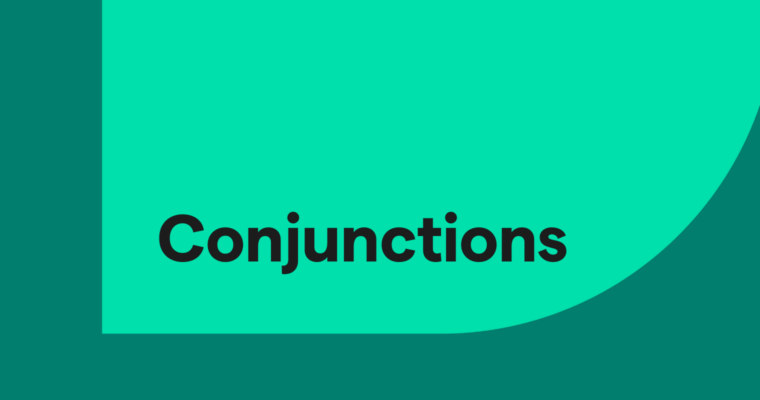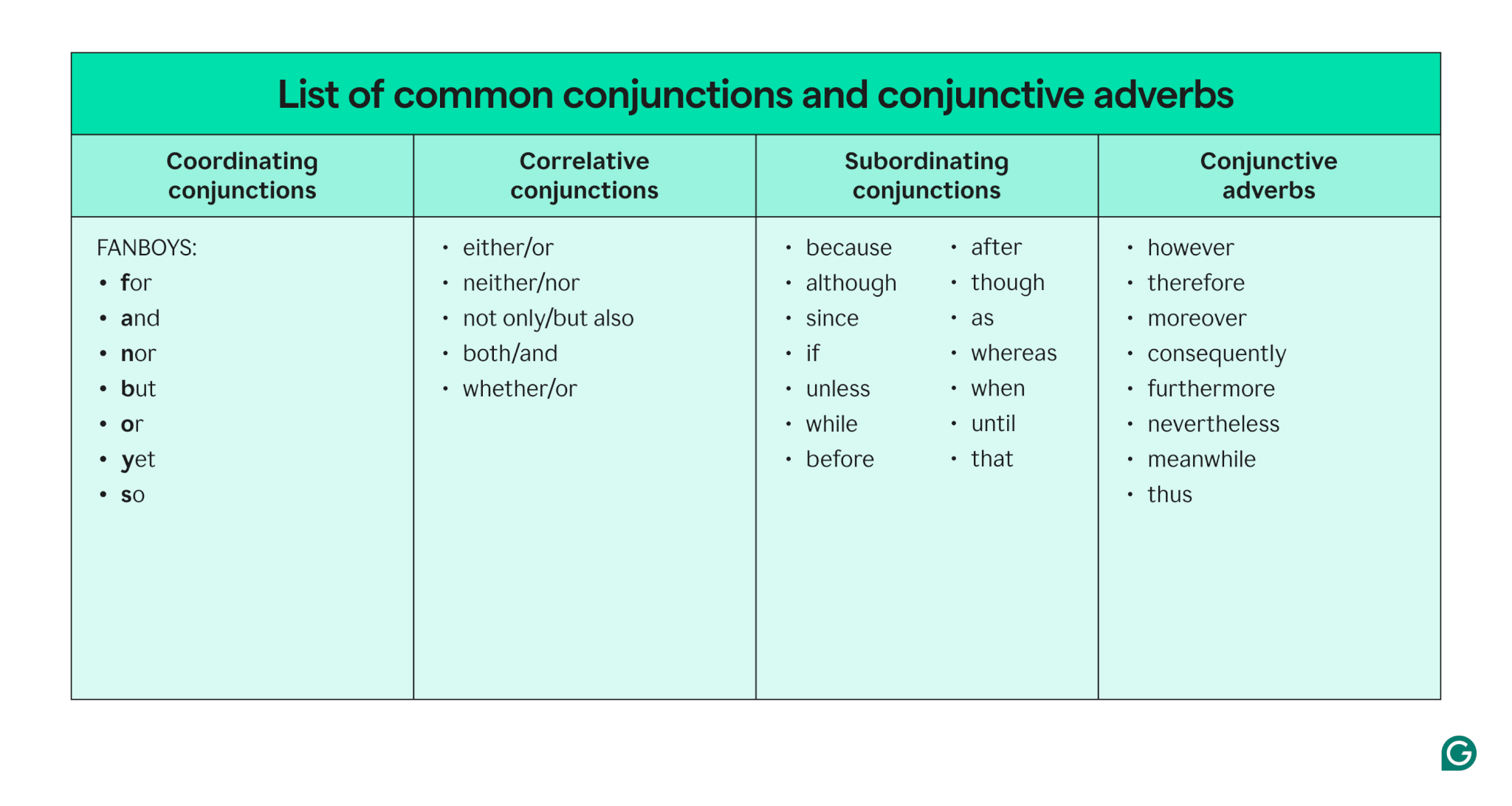
- Conjunctions are words that join phrases, clauses, or words within a sentence, helping us to communicate interconnected and complex things coherently.
- There are three main types of conjunctions: coordinating, correlative, and subordinating.
- Coordinating conjunctions, often represented by the acronym FANBOYS (for, and, nor, but, or, yet, and so), connect words, phrases, or independent clauses of equal grammatical importance in a sentence.
- Correlative conjunctions operate in pairs—such as either/or and neither/nor—framing grammatically equivalent elements in order to connect clauses that together form a complete thought.
- Subordinating conjunctions, including although, because, that, and while, connect a dependent clause to the independent clause of a sentence, indicating a specific logical relationship between the two.
Here, we’ll discuss the different types of conjunctions and demonstrate with examples how to use them correctly.
Table of contents
Starting a sentence with a conjunction
List of common conjunctions and conjunctive adverbs
Definition of a conjunction
A conjunction is a word that links other words, phrases, or clauses together. There are three main types of conjunctions: coordinating, correlative, and subordinating.
How do conjunctions work?
Conjunctions create connections that identify the logical relationships between ideas or sentence elements. These relationships may be used to indicate an addition (as with and), create contrast (but, yet, although), establish cause and effect (because), or introduce a condition (unless), among other things.
Why conjunctions matter in writing
Conjunctions allow you to put together cohesive ideas and incorporate variety in your sentence structures so that you can balance longer, more involved sentences with concise ones. Knowing how to use conjunctions properly enhances the clarity of your writing as well as its overall rhythm and tone.
Without conjunctions, you’d be forced to express every complex idea in a series of short, simplistic sentences: I like cooking. I like eating. I don’t like washing dishes afterward.
With conjunctions, sentences can be more fluid and sophisticated, and the logical connections between them can be clearly expressed: I like cooking and eating, but I don’t like washing dishes afterward.
Here are some further examples, which present the same ideas, first without conjunctions and then with them:
- Without conjunctions: I am a member of that gym. I can reserve a spot at fitness classes ahead of time. If I were not a member, I would have to arrive early to be sure I could attend. I would have to wait in line for the door to open to be sure I could attend.
- With conjunctions: Because I am a member of that gym, I can reserve a spot at fitness classes ahead of time, but otherwise I would have to both arrive early and wait in line for the door to open in order to be sure I could attend.
Not only is the example without conjunctions distractingly choppy, the logical relationships between its elements are unclear.
Coordinating conjunctions
Coordinating conjunctions allow you to join words, phrases, and clauses of equal grammatical rank in a sentence. The most common coordinating conjunctions are for, and, nor, but, or, yet, and so; you can remember them with the acronym FANBOYS.
In the following sentence, the coordinating conjunction or is connecting two nouns: pizza and salad:
When the elements that a coordinating conjunction joins are two independent clauses, a comma is used before the conjunction:
It’s important to make sure that the words or phrases joined by coordinating conjunctions are parallel (have the same structure):
It’s also important not to make the common error of creating a run-on sentence, which is a compound sentence in which two independent clauses are incorrectly separated by just a comma:
Incorrect: I work quickly, I check my work carefully.
Run-on sentences can be corrected by either adding a coordinating conjunction or changing the comma to a semicolon or period:
Examples of coordinating conjunctions in sentences
Here are some more examples of coordinating conjunctions in sentences:
Correlative conjunctions
Correlative conjunctions are pairs of conjunctions that work together by framing and connecting grammatically identical sentence elements. Some common examples are both/and, either/or, neither/nor, and not only / but also.
It’s important to pair correlative conjunctions correctly; avoid common errors like I take both pilates as well as swimming at the YMCA (it should be I take both pilates and swimming at the YMCA).
Examples of correlative conjunctions in sentences
Subordinating conjunctions
Subordinating conjunctions join dependent clauses to the independent clauses of sentences, signaling cause and effect, comparison, contrast, time, or some other kind of relationship between the clauses. Common subordinating conjunctions include because, since, as, although, though, until, while, and whereas. They introduce a dependent clause that depends on the sentence’s independent clause to make sense:
Here, the presence of the subordinating conjunction until makes until the clock strikes twelve a dependent clause; it is dependent on the independent clause (I can stay out) for its meaning, and it in turn provides clarifying information about the independent clause.
A subordinating conjunction doesn’t need to go between the two clauses the way it does in the above examples. It must introduce the dependent clause, but the dependent clause can come before the independent clause.
If the dependent clause comes first, use a comma before the independent clause.
That as a subordinating conjunction
The word that, which is usually a demonstrative pronoun or a relative pronoun, sometimes acts as a subordinating conjunction by introducing a dependent clause after certain kinds of verbs, adjectives, and nouns in a sentence’s independent clause.
That clauses with verbs
Dependent clauses beginning with that often follow verbs that express acts of statement (such as say, report, indicate, and so on) or acts of thought (think, know, believe, hope, imagine, and so on):
That clauses with adjectives
Another kind of dependent clause introduced by that often follows an independent clause with a form of to be and an adjective having to do with a feeling or opinion. These adjectives include sure, certain, excited, sorry, and others:
That clauses with nouns
Independent clauses with certain nouns that name opinions, feelings, or statements used as direct objects, indirect objects, or objects of prepositions are also often followed by dependent clauses beginning with that. Such nouns include belief, fact, hope, idea, and possibility:
Omitting that
That as a subordinating conjunction in any of the above circumstances can be omitted if the meaning remains clear:
Examples of subordinating conjunctions in sentences
Conjunctive adverbs
A conjunctive adverb is an adverb that does the job of a conjunction: It connects two clauses or ideas by modifying one of them. Functionally, it can link two independent clauses in one sentence using a semicolon between the clauses and, usually, a comma after the conjunctive adverb. It can also link the ideas in two sentences or link ideas within an independent clause.
Conjunctive adverbs often express ideas of addition (also, besides, furthermore), cause and effect (accordingly, consequently, therefore), clarification (namely, that is), comparison (likewise, similarly), contrast (however, regardless, still), emphasis (certainly, indeed), or time (meanwhile, recently, beforehand).
Examples of conjunctive adverbs in sentences
Starting a sentence with a conjunction
Many of us were taught in school that it’s a mistake to begin a sentence with a conjunction, but that rule is a myth. As mentioned above, a subordinating conjunction can begin a sentence if the dependent clause comes before the independent clause.
It’s also correct to begin a sentence with a coordinating conjunction. Often, it’s a good way to add emphasis. Beginning too many sentences with conjunctions will cause the device to lose its force, however, so use this technique sparingly.
List of common conjunctions and conjunctive adverbs
Here’s a table showing common coordinating conjunctions, correlative conjunctions, subordinating conjunctions, and conjunctive adverbs.

Conjunctions are often small words, but they do a big job, allowing you to make smooth and elegant logical connections while varying the lengths and structures of your sentences. Mastering the different types of conjunctions and how to use them correctly will advance the sophistication and clarity of your writing immeasurably.
Conjunctions FAQs
What are the three main types of conjunctions?
Coordinating conjunctions allow you to join words, phrases, and clauses of equal grammatical rank in a sentence. The most common coordinating conjunctions are for, and, nor, but, or, yet, and so.
Correlative conjunctions are pairs of conjunctions that work together. Some examples are both/and, either/or, and neither/nor.
Subordinating conjunctions signal cause and effect, a contrast, or some other kind of relationship between the clauses. Common subordinating conjunctions are because, since, as, and although.
Can you start a sentence with a conjunction?
Starting a sentence with a coordinating conjunction like and, but, or so is grammatically acceptable, especially in conversational or informal writing. However, be mindful of not starting too many sentences with coordinating conjunctions, as this can make the writing feel repetitive.
What is the difference between a conjunction and a conjunctive adverb?
A conjunctive adverb is similar to a coordinating conjunction in that it links sentences, independent clauses, or other grammatically equal elements. It is different in that it does this while still functioning as an adverb, turning the clause that it introduces into an adverbial modifier of the previous clause.






